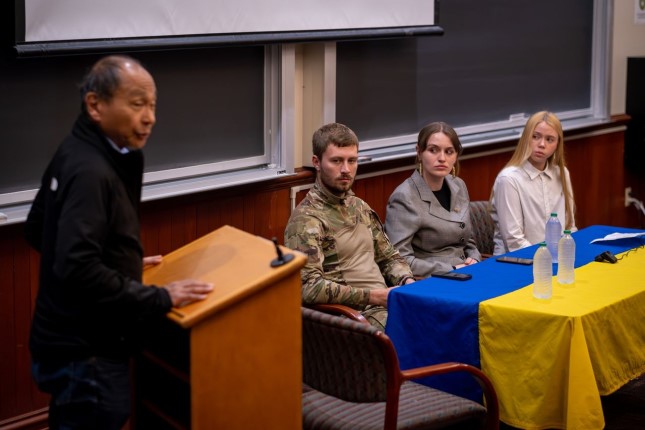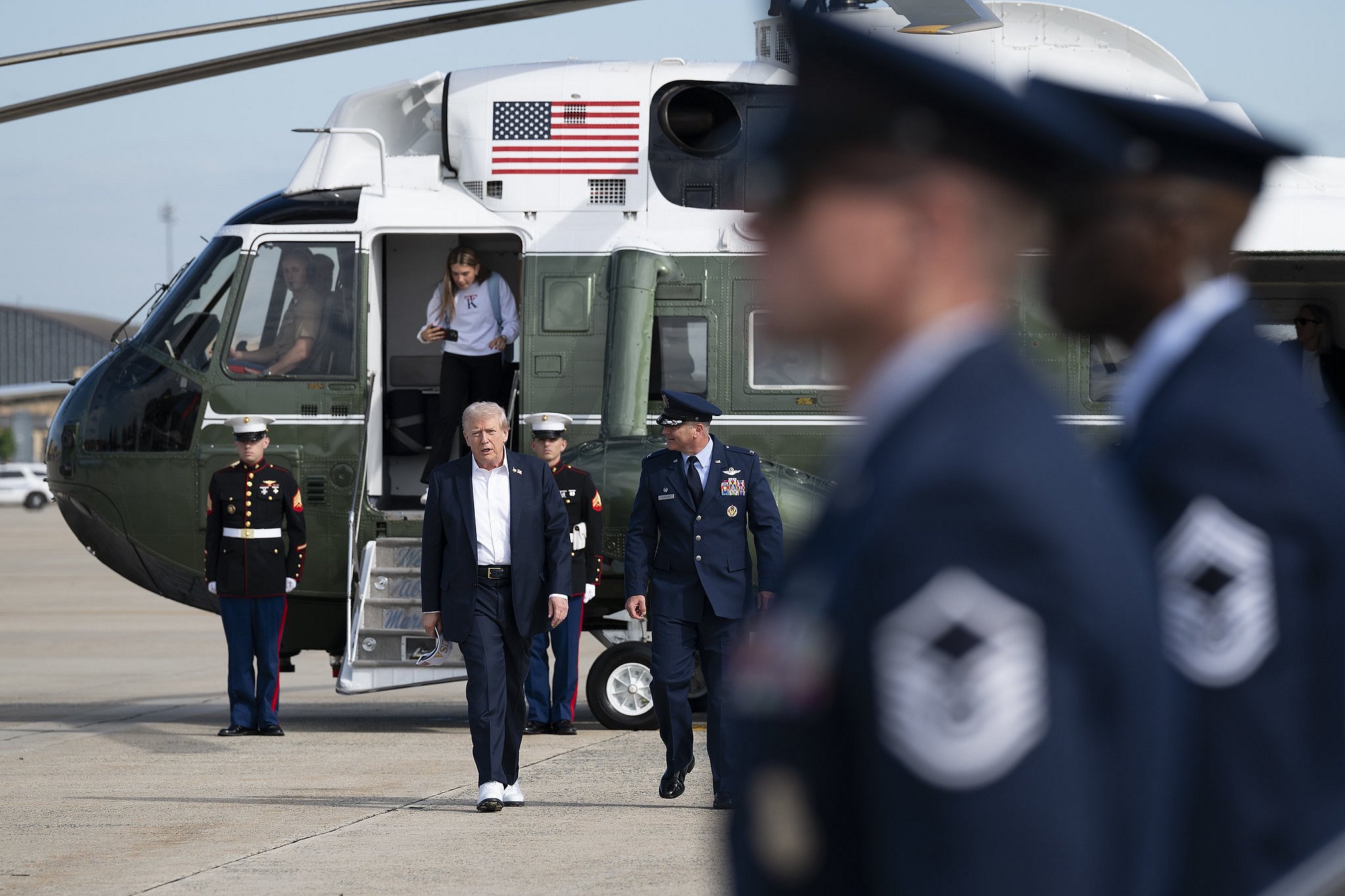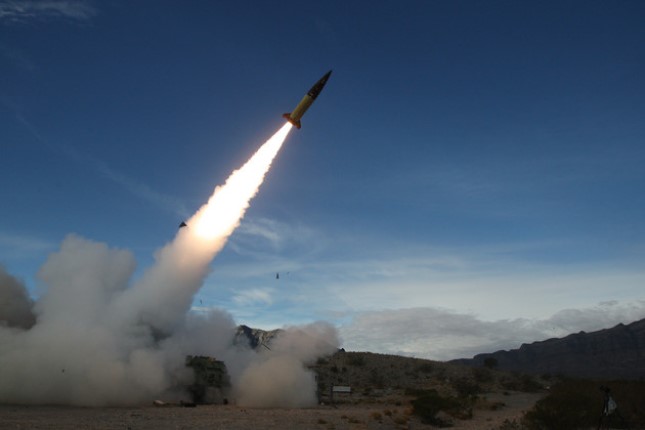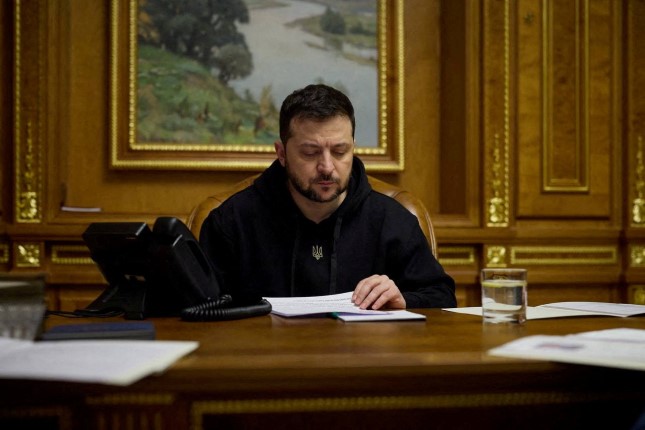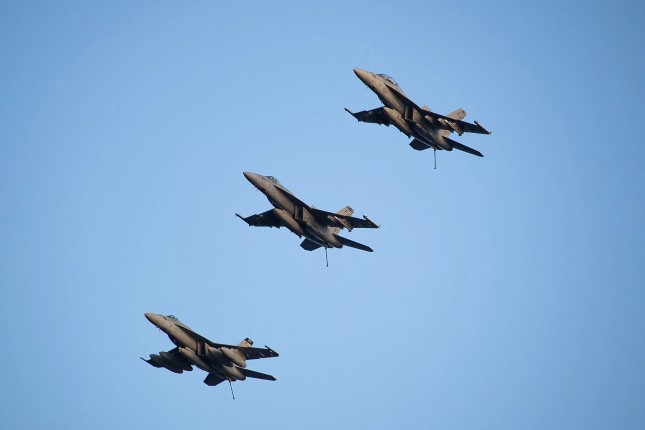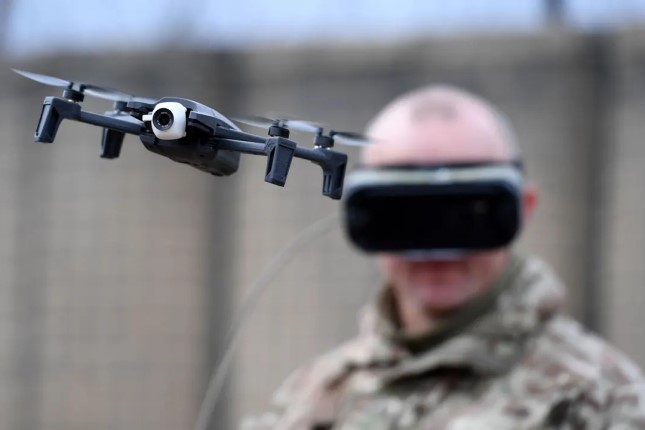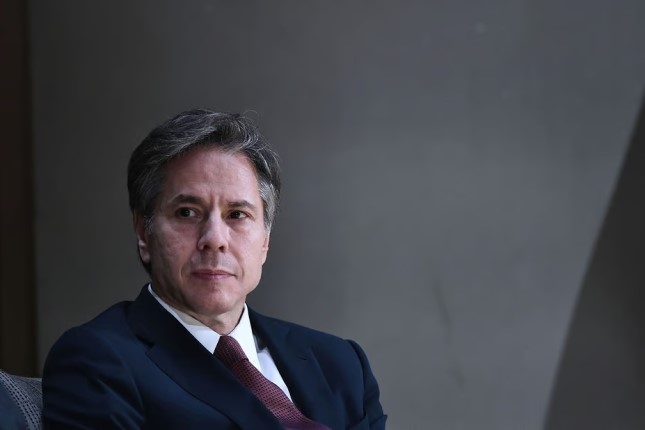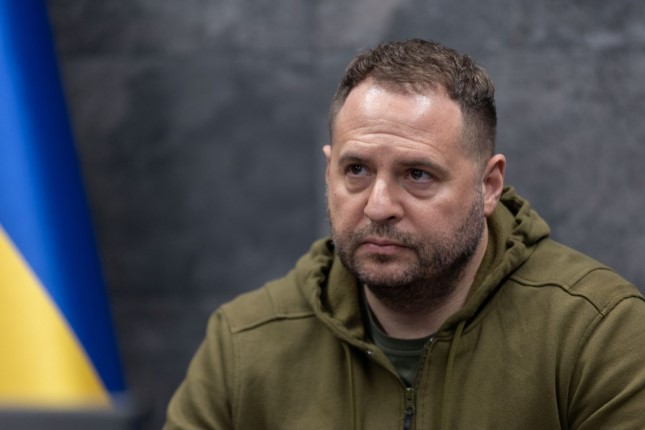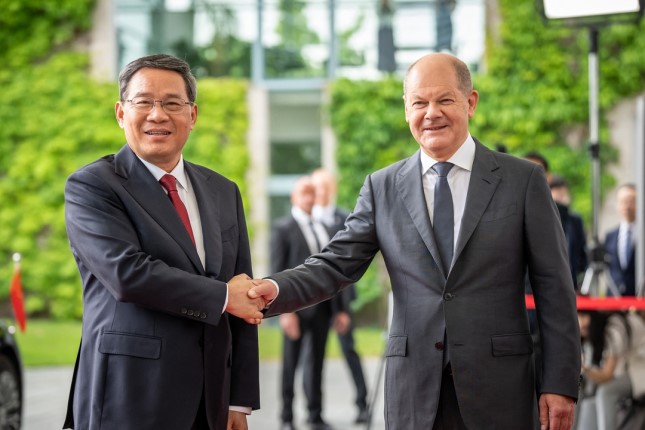Insignia associated with fascism, such as the official logo of the Azov Battalion, which is deliberately modeled after the Nazis’ Wolfsangel symbol, were used to promote the event on campus.
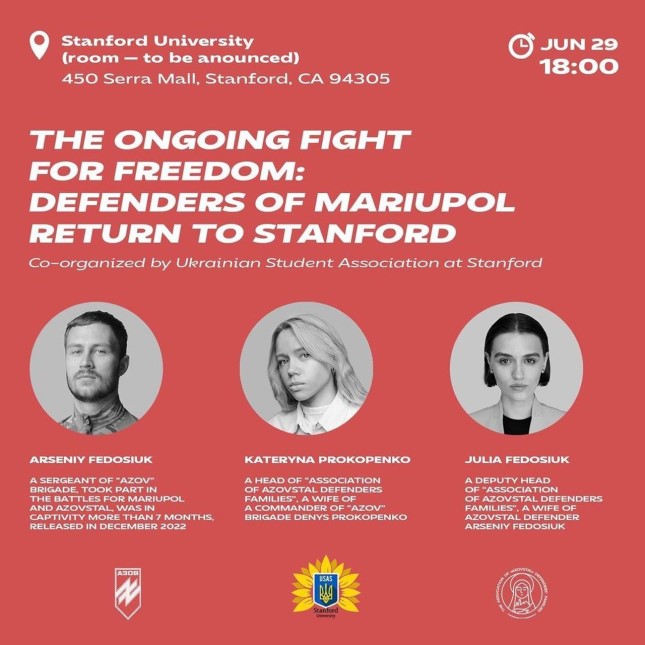
The poster used to promote the Azov event at Stanford. It includes the official logo of Azov with the Wolfsangel insignia, as well as the insignia used by the Nazi collaborating Organization of Ukrainian Nationalists-Bandera, which the Ukrainian Student Association at Stanford adopted as its official logo. Photo: Facebook page of the Ukrainian Student Association at Stanford.
The speakers were Arsenyi Fedosiuk, sergeant in the Azov Battalion; his wife Julia Fedosiuk, co-founder of the Association of Families of Azovstal’ Defenders; and Kateryna Prokopenko, founder and leader of the Association of Families of Azovstal’ Defenders. Prokopenko is the wife of Azov Commander Denys Prokopenko, who led the organization until his capture last year and is known for proudly displaying the SS bearded Totenkopf insignia as well as the Wehrmacht Wolfsangel symbol.
Before joining Azov in 2014, Denys Prokopenko was a member of the White Boys Club, a neo-Nazi fan club of the Dynamo Kyiv soccer team. Its Facebook posts have included photos of graffiti with their organization’s name alongside the number “88,” the neo-Nazi code for “Heil Hitler.”
The same members and family supporters of Azov have also been meeting with members of Congress of both parties as well as representatives of the Green Party in Germany.
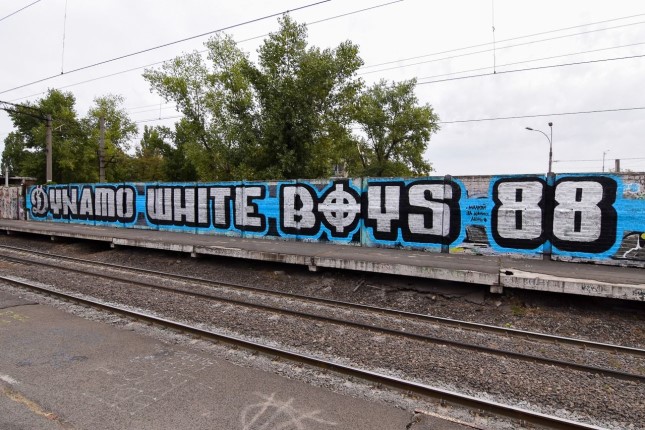
A 2019 graffiti of the Kiyv Dynamo “White Boys” fan club with the neo-Nazi code for “Heil Hitler”. Photo: Facebook page of the White Boys Club.
Francis Fukuyama, a professor at Stanford and a fellow with Stanford’s “Center on Democracy, Development and the Rule of Law,” introduced the neo-Nazis. Even after the event had created a public backlash, Fukuyama defended Azov, falsely claiming, “They originated among Ukrainian nationalists, but to call them neo-Nazis is to accept Russia’s framing of what they represent today. By the time they defended Mariopol they were fully integrated into the [Armed Forces of Ukraine] and are heroes that I’m proud to support.”
This is a blatant lie. Even Stanford’s own Center for International Security and Cooperation (CISAC), acknowledges, in a profile that was last updated in 2022, “The Azov Movement is a far-right nationalist network of military, paramilitary, and political organizations based in Ukraine.”
The Azov Battalion was founded in 2014 by white supremacist Andriy Biletsky who advocated a “crusade of the white nations of the world against the Semitic-led subhumans.” The organization is teeming with fascists and racists who idolize Stepan Bandera, whose Organization of Ukrainian Nationalists (OUN-B) collaborated with the Nazis during World War II in carrying out the Holocaust in Ukraine. Bandera’s forces also engaged in an ethnic mass murder of tens of thousands of Poles. Today, monuments to him have been erected throughout Ukraine, and the fascist slogan “Slava Ukraini” (Glory to Ukraine) is regularly used by Western politicians. The Ukrainian Student Association at Stanford has adopted as its official logo the OUN-B emblem, which was also used to designate officers of the Ukrainian Hilfspolizei under the Nazis.
The role played by Francis Fukuyama in promoting these neo-Nazis is revealing. A former adviser to the Reagan administration and later a supporter of Barack Obama, Fukuyama has long been a leading ideologist of the US ruling class. He is best known for proclaiming the collapse of Stalinism in 1989-1991 to be the “end of history.” In an article for Foreign Affairs in 1989, Fukuyama declared that “the end point of mankind’s ideological evolution and the universalization of Western liberal democracy” had been reached.
At the time, the International Committee of the Fourth International insisted, that, far from marking “the end of history,” the collapse of the Stalinist regimes in Eastern Europe and the Soviet Union marked a new stage in the crisis of world imperialism and a new period of imperialist wars and revolutions. The fundamental contradictions of world capitalism that had given rise to two world wars, fascism, and the 1917 October Revolution remained in full force, and the 20th century, far from being over, remained “unfinished.”
This assessment has been confirmed in spades. The 30 years that followed the destruction of the USSR were a period of unending imperialist wars and skyrocketing social inequality. The US, presumably the beacon of capitalist democracy, has undergone a fascist coup attempt. The imperialist powers are now waging an undeclared war against Russia in Ukraine while preparing for war against China in an emerging new imperialist redivision of the world. In proudly sharing a platform with Ukrainian neo-Nazis who are fighting a war on behalf of US imperialism, Fukuyama, the erstwhile prophet of the triumph of “liberal democracy,” has become the embodiment of the bankruptcy of his own theory.
But there is another element to this event that deserves analysis.
Held during summer break and sparsely attended by students, the meeting with Azov was organized by and for far-right forces and elements within the American state apparatus and those who want to become part of it. Previously, the Ukrainian Student Association at Stanford has hosted Ukrainian President Zelensky as well as Michael McFaul, a professor at Stanford and former US ambassador to Russia who has played an important role in US imperialist operations in Eastern Europe for decades.
Yet while the event was clearly not held to attract a large audience, it also did not evoke any serious opposition. The faculty of Stanford or, for that matter, other universities, met the appearance of Ukrainian neo-Nazis and fascist insignia with a collective shrug. Stanford has not even bothered to respond to repeated inquiries about the university’s position regarding the Azov event prominently displaying the Wolfsangel.
This is a particularly stark manifestation of a far broader phenomenon. One and a half years into the war in Ukraine, which has cost hundreds of thousands of lives, there has not been a single serious discussion organized on campus by faculty on the historical and political origins of the war, much less any meeting in opposition to the war. Instead, NATO officials and warmongers, as well as officials of the Ukrainian administration of Volodymyr Zelensky, have been paraded on US campuses. An international anti-war meeting series by the IYSSE in the spring was met with systematic attempts at censorship by Ukrainian far-right nationalists and the state apparatus.
Such a development can only be explained based on an analysis of the class forces on campus and the foul intellectual climate that has been created by decades of anti-Marxism and the promotion of postmodernist thought.
The last thirty years of uninterrupted imperialist wars abroad and social counter-revolution at home that followed the end of the USSR also saw the ever closer integration of academic institutions, especially the so called “elite” universities, into the state and military apparatus and Wall Street.
Stanford University is a primary example. The university’s Board of Trustees is largely composed of hedge fund managers and Wall Street executives, including Gene T. Sykes, the managing director of Goldman Sachs. The university has also long been notorious for the right-wing Hoover Institution, which is currently led by war criminal Condoleezza Rice, a key figure in the 2003 invasion of Iraq.
The Hoover Institution has historically been a central hub for the promotion of right-wing historical revisionism and falsifications. Most notably, it has hosted workshops with far-right academics like Jörg Baberowski from Berlin’s Humboldt University, who has since emerged as a central figure in the international effort by academics to minimize the crimes of Nazism. Another attendee of Hoover’s workshops was Robert Service, the author of a hack biography of Leon Trotsky which systematically falsifies the life and work of the revolutionary and makes unabashed use of old Stalinist and antisemitic slanders.
The ICFI and the WSWS have conducted a systematic campaign for decades to expose and refute these historical falsifications. Yet even before the war began, with very important exceptions, neither these blatantly politically motivated lies about the role of Leon Trotsky and the history of the October revolution, nor the pro-Nazi falsifications of Jörg Baberowski and the systematic legitimization of the crimes of German and Eastern European fascism by Yale University’s Timothy Snyder, met any serious opposition among academics.
The postmodernist rejection of an objective and scientific study of history and the promotion of various irrational and subjectivist conceptions has significantly contributed to an intellectual and political climate that has allowed for this flourishing of unabashed far-right historical revisionism and fascist thought. But underlying these shifts in significant sections of the academic intelligentsia have been real material interests.
The same socio-political developments that meant war and social destitution for millions of workers over the past decades were accompanied by a significant elevation in the social status of layers of the middle class, including the upper echelons of academia. Comprising the top 10 or even top 5 percent of the income bracket, these layers see their social privileges bound up with the preservation of capitalism and, more specifically, the advancement of the interests of US imperialism.
These social processes were the material basis for the immense shift to the right of sections of the middle class that dominated the anti-war movements of the past. Along with their opposition to imperialist war, as limited as it may have been, they have dropped not only any form of critical thought but also any meaningful opposition to fascism.
Since the beginning of the war, there has been an almost complete intellectual collapse in this layer, which has lined up shamelessly behind the war aims and propaganda of US imperialism. In the war propaganda by the pro-NATO media, the historical falsifications, concocted by academics, have been used systematically to whitewash the “new old friends” of US imperialism in the war against Russia: the Ukrainian fascists. The New York Times regularly quotes Azov commanders as primary sources in its lying “coverage” of the war. It has also effectively adopted the far-right revisionist narrative of history, going so far as to claim that the Soviet Union’s Red Army launched World War II.
The fact that neo-Nazis are now paraded on campuses of leading academic institutions in the US must be seen as an alarming sign of the extent of the rightward shift of both the bourgeoisie and significant sections of the middle class and academia. Serious intellectuals, students and young people must draw far-reaching conclusions from this development. The fight against imperialist war and fascism can only be developed based on the working class, and a determined struggle against all forms of historical falsification. This requires a return to the traditions of Marxism, which are today embodied in the Trotskyist movement, the International Committee of the Fourth International, and its youth organization, the IYSSE.
Main photo: Francis Fukuyama (left) with Arsenyi Fedosiuk, Julia Fedosiuk and Kateryna Prokopenko © Facebook page of the Ukrainian Student Association at Stanford.
Source: World Socialist Web Site.
